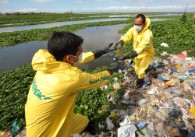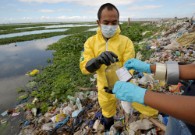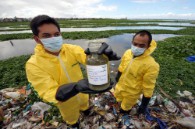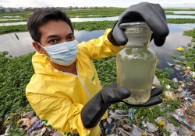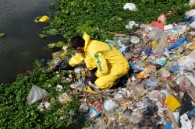Calls for strict enforcement of waste laws to protect water sources
threatened freshwater sources, and is also reminding the public that waste dumped on land eventually ends up in the water that we use.
As part of the investigation, the activists procured water
samples in the vicinity, and placed a signpost with the words “Our
trash. Our water. Protect our water sources!” to also remind the
public, in time for Earth Day tomorrow, that waste dumped on land
eventually ends up in the water that we use. The theme for this
year’s Earth Day in the Philippines is water protection.
“Illegal, open dump sites have remapped the banks of Laguna
Lake, creating reclaimed areas built on the filthy refuse of towns
and cities, and slowly killing one of the major freshwater bodies
in our country. How have we come to this? Clearly there is a
serious shortcoming in the government’s enforcement of its own
environmental laws,” said Greenpeace Toxics Campaigner Beau
Baconguis.
“But Greenpeace would also like to highlight this Earth Day that
this should be a call to action for all Filipinos to adopt a more
responsible attitude toward the waste they generate and dispose.
Through the simple practice of responsible waste management at
home, such as segregation and composting of organic waste, we can
be part of the solution to the problem of garbage and water
pollution.”
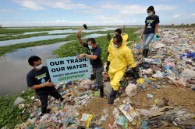
The Laguna Lake Development Authority (LLDA) disclosed last
December that dumpsites in four municipalities-Paete and Biñan,
Laguna, and Angono and Taytay, Rizal-are located close to Laguna
Lake’s shores. Meanwhile fourteen dumpsites various other nearby
towns compound the lake’s water pollution problem. Although the
LLDA has asked the concerned local government units to implement
the Ecological Waste Management Act of 2000 (RA 9003) the dumps
continue to pollute the lake. oxic leachate from the said garbage
dumps are expected to ooze into the lake for years to come, even
after the dumps are successfully closed.
The dumps in Angono and Taytay, in particular, occupy the lake’s
waters in blatant violation of the Clean Water Act of 2004 (RA
9275), and RA 9003. The Angono dumpsite was supposedly declared
closed by Mayor Aurora Villamayor last January 2008, but Greenpeace
Water Patrol investigations encountered garbage trucks delivering
fresh garbage to the site just a week ago. The Taytay dumpsite, on
the other hand, is still fully operational.
Laguna Lake, also known as Laguna de Bay, is the country’s
largest lake, and the 2nd largest freshwater basin in Southeast
Asia. It is being eyed as a potential source of potable water for
Metro Manila. However, according to the LLDA, the lake is in
danger of dying in five years if no steps are taken to improve its
fast deteriorating water quality.
“Greenpeace would also like to highlight this Earth Day that
this should be a call to action for all Filipinos to adopt a more
responsible attitude toward the waste they generate and
dispose.”
Beau Baconguis
Greenpeace Toxics Campaigner
“Starting with the Angono dumpsite, Greenpeace is taking samples
of water within the lake as part of our larger campaign, Project
Clean Water, launched last October 2007. The project aims to bring
people together toward a common goal of safeguarding our water
sources. We intend to examine and expose the pollution levels of
various freshwater sources around the country. Through this, we
hope to catalyze much-needed action to reverse the continuing
decline of our water resources,” said Baconguis. Greenpeace
expects to release the partial results of its investigations later
this year.
Get involved!
Join our water patrol community!

